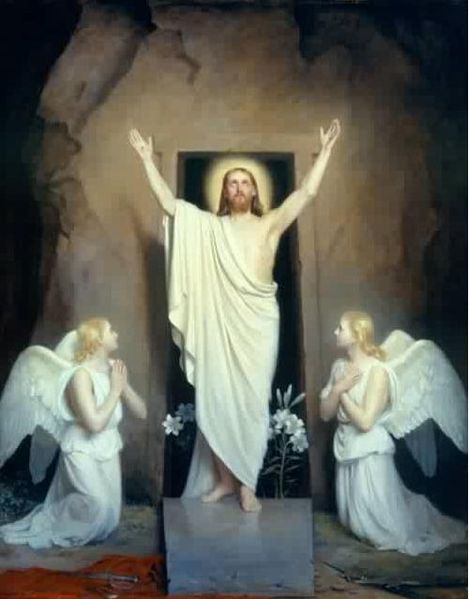
Carl Heinrich Bloch – The Resurrection Of Christ
Do you know that all of us who have been baptized into Christ Jesus were baptized into his death? … If we have been united with him in a death like his, we will certainly be united with him in a resurrection like his. (Romans 6: 3, 5)
On a day we now call “Easter” Christians gather to celebrate God’s resurrection of Jesus Christ. This holy day lies at the very heart of Christian faith – especially in its Moravian expression. Moravians have been called “The Easter People.” Yet amid the glories of sunrise worship, the fellowship of an early morning breakfast together, and cherished, if painful memories of those who “have entered into the joy of their Lord” since last Easter Day, how many find time to reflect on the full implications of belief in the resurrection of the dead?
Resurrection is not a description of an afterlife; resurrection is the reversal of death itself. It is the triumph of God over grave. To believe in the resurrection of the dead is to hope for something more than continued personal existence as an immortal soul after one’s body has perished. It is to share the faith of the Old Testament’s Job who said: “For I know that my Redeemer lives, and that at the last he will stand upon the earth; and after my skin has been thus destroyed, then in my flesh I shall see God.” (Job 19: 25, 26)
According to ancient Hebrew belief, soul and body were aspects of a differentiated, but unified person rather than independent components existing in their own right. Not until they were influenced by the thought of the Greek philosopher Plato did Jewish writers begin to speculate about the continuation of the soul apart from the body. The earliest expressions of Christian faith accord with their ancient Jewish antecedents.
In the Resurrection, God gives life not to some disembodied spiritual aspect of Jesus, but to an Incarnation – a person of flesh and blood. On this St. Paul and all the Gospels agree. Following his resurrection, Jesus eats with his disciples, teaches them, and has them touch him. “Look at my hands and my feet; see that it is I myself. Touch me and see; for a ghost does not have flesh and bones as you see that I have.” (Luke 24:39) The Gospel of John portrays Christ inviting Thomas to touch the nail-wounds in his Savior’s hands. (John 20:27)
Belief shapes our approach to the world and to life. If we believe only in the immortality of the soul we may be tempted to turn our backs on the world’s problems, live as best and as happily as we can and take comfort in the thought that we are only passing through. If we believe that at the last Christ will stand on the earth and that we, in our flesh shall see God, we do not have the luxury of such individualistic detachment and complacency.
God’s resurrection of Jesus is the opening act of a new work of redemption and renewal touching all aspects of creation, both physical and spiritual, so that the Creator’s will might be done on earth as it is in heaven. If we have been baptized into the death of Jesus, if we hope for and anticipate a resurrection like his, it follows that we must begin living into that reality today.
- Pastor Derek French
